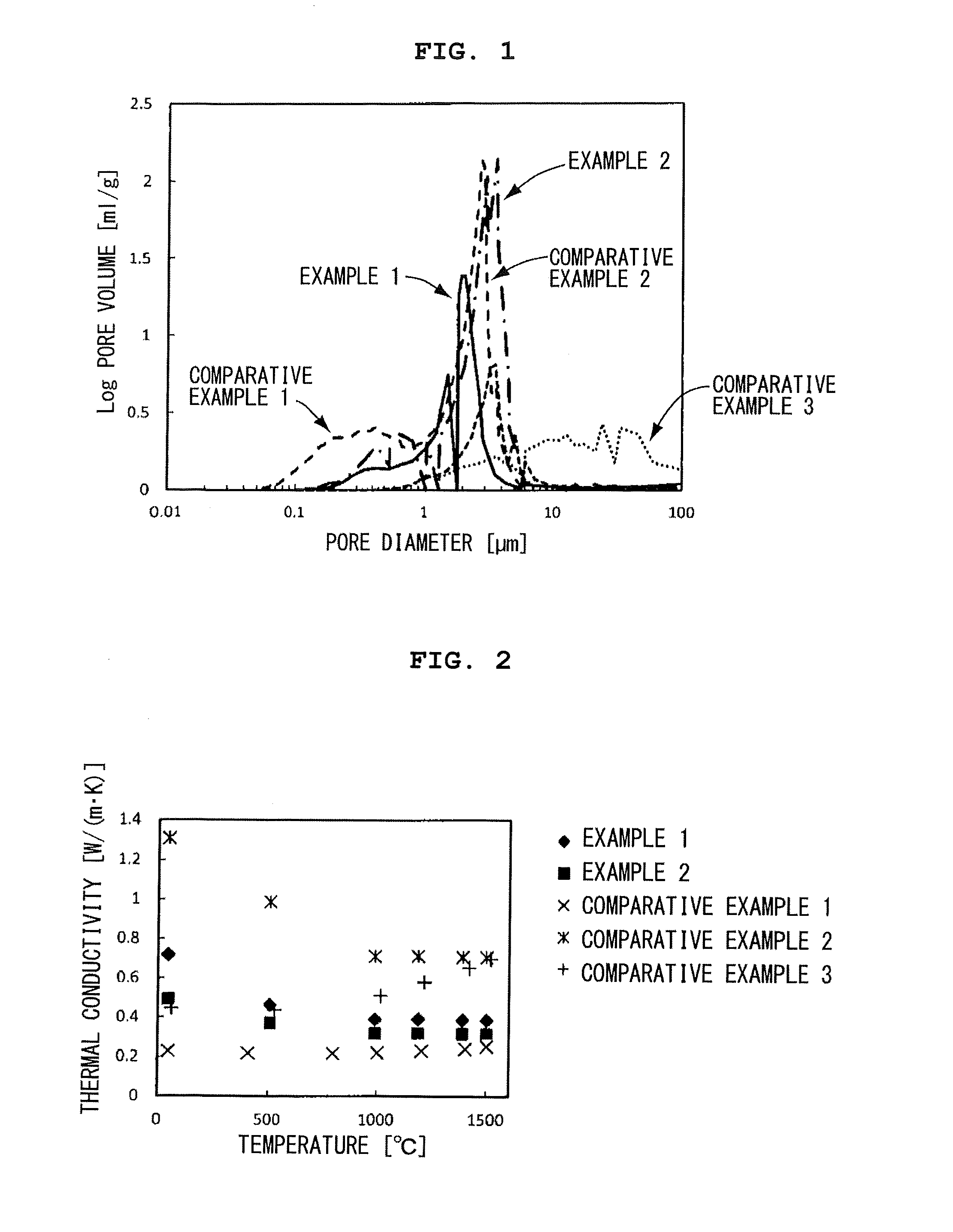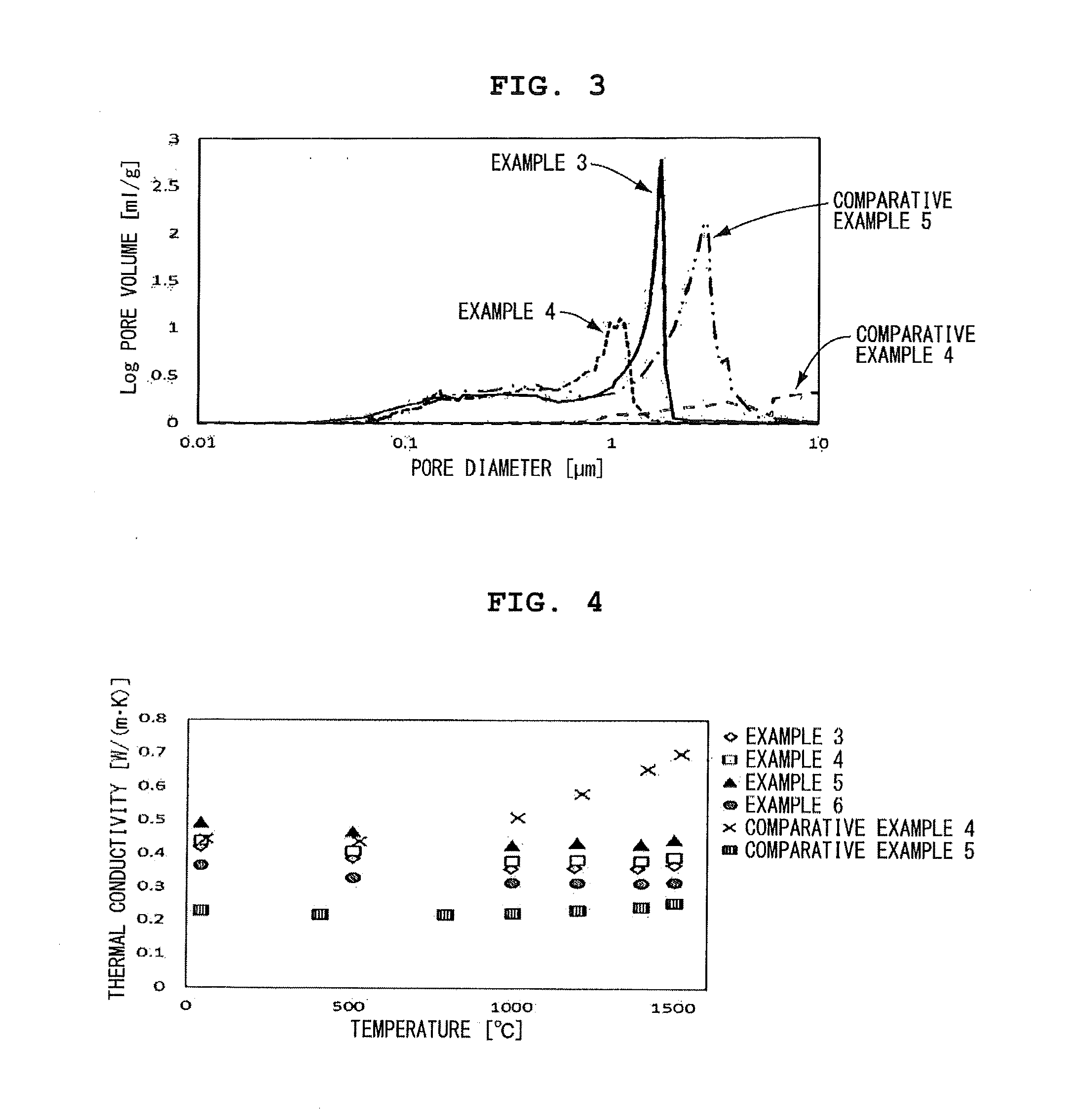Heat Insulating Material
a heat insulation material and heat insulation technology, applied in the field of heat insulation materials, can solve the problems of low heat resistance and unknown thermal conductivity, and achieve the effects of excellent heat resistance, excellent heat insulation performance, and high strength
- Summary
- Abstract
- Description
- Claims
- Application Information
AI Technical Summary
Benefits of technology
Problems solved by technology
Method used
Image
Examples
example 1
[0079]Mixing was performed at a ratio of 11 mol of hydraulic alumina powder (BK-112, manufactured by Sumitomo Chemical Co., Ltd.) to 9 mol of magnesium oxide powder (MGO11PB, manufactured by Kojundo Chemical Laboratory Co., Ltd.). Pure water equivalent in weight to a total weight of hydraulic alumina and magnesium oxide was added thereto. The resultant mixture was dispersed uniformly to prepare a slurry.
[0080]Then, a granular acrylic resin having a diameter of 10 μm was added to the slurry at a ratio of 50 vol % with respect to the slurry as a pore forming material for mixing. The resultant mixture was molded to obtain a molded body of 60 mm×70 mm×20 mm.
[0081]This molded body was fired at 1800° C. for three hours in the atmosphere to manufacture a porous sintered body.
[0082]A crystal phase of the porous sintered body obtained above was identified by X-ray diffraction (apparatus for X-ray diffraction: manufactured by Rigaku Corporation, RINT2500, X-ray source: CuKα, voltage: 40 kV, c...
example 3
[0100]Mixing was performed at a ratio of 11 mol of hydraulic alumina powder (BK-112, manufactured by Sumitomo Chemical Co., Ltd.) to 9 mol of magnesium oxide powder (MGO11PB, manufactured by Kojundo Chemical Laboratory Co., Ltd.). Pure water equivalent in weight to a total weight of hydraulic alumina and magnesium oxide was added thereto. The resultant mixture was dispersed uniformly to prepare a slurry. Then, a granular acrylic resin having a diameter of 10 μm was added to the slurry at a ratio of 50 vol % with respect to the slurry as a pore forming material for mixing. The resultant mixture was molded to obtain a molded body of 60 mm×70 mm×20 mm. This molded body was fired at 1600° C. for three hours in the atmosphere to manufacture a porous sintered body.
[0101]A crystal phase of the porous sintered body obtained above was identified by powder X-ray diffractometry (apparatus for X-ray diffraction: manufactured by Rigaku Corporation, RINT2500, X-ray source: CuKα, voltage: 40 kV, c...
PUM
| Property | Measurement | Unit |
|---|---|---|
| porosity | aaaaa | aaaaa |
| porosity | aaaaa | aaaaa |
| pore diameter | aaaaa | aaaaa |
Abstract
Description
Claims
Application Information
 Login to View More
Login to View More - R&D
- Intellectual Property
- Life Sciences
- Materials
- Tech Scout
- Unparalleled Data Quality
- Higher Quality Content
- 60% Fewer Hallucinations
Browse by: Latest US Patents, China's latest patents, Technical Efficacy Thesaurus, Application Domain, Technology Topic, Popular Technical Reports.
© 2025 PatSnap. All rights reserved.Legal|Privacy policy|Modern Slavery Act Transparency Statement|Sitemap|About US| Contact US: help@patsnap.com


